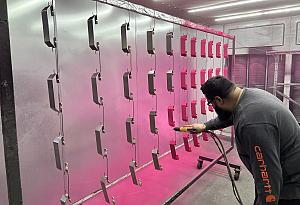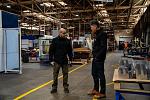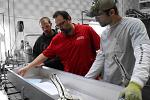- FMA
- The Fabricator
- FABTECH
- Canadian Metalworking
Categories
- Additive Manufacturing
- Aluminum Welding
- Arc Welding
- Assembly and Joining
- Automation and Robotics
- Bending and Forming
- Consumables
- Cutting and Weld Prep
- Electric Vehicles
- En Español
- Finishing
- Hydroforming
- Laser Cutting
- Laser Welding
- Machining
- Manufacturing Software
- Materials Handling
- Metals/Materials
- Oxyfuel Cutting
- Plasma Cutting
- Power Tools
- Punching and Other Holemaking
- Roll Forming
- Safety
- Sawing
- Shearing
- Shop Management
- Testing and Measuring
- Tube and Pipe Fabrication
- Tube and Pipe Production
- Waterjet Cutting
Industry Directory
Webcasts
Podcasts
FAB 40
Advertise
Subscribe
Account Login
Search
Rapid Creek Cutters—The second time around
- By Vicki Bell
- February 24, 2009
- Article
- Shop Management
Pat Burrington, the manin the one-man shop, Inkom, Idaho-based Rapid Creek Cutters, believes that if you are thinking about a career in welding, you seriously should think about starting your own small business at some point in your life … "maybe not right out of the gate, but eventually. It's very gratifying at times and is something everyone should experience, if they so desire. [Those who do] will have a greater respect and appreciation for all that goes on behind the scenes of a small business after they run one themselves."
Burrington speaks from experience. He's gone into business for himself not once, but twice. He learned a lot from his initial venture and now is enjoying the fruits of his knowledge and labor in a fabricating business that continues to grow, even in this tough economy. His story may inspire you to venture out on your own.
Laying the Groundwork
A veteran, Burrington was a welder in the U.S. Army from 1988 to 1992. Following his honorable discharge, he enrolled in college on the GI Bill and continued his training in a skill he first began developing in high school and practiced in the Army.
Burrington earned two degrees from Southeast Community College in Milford, Neb.—one in welding/metallurgy and the other in nondestructive testing/quality control. He regards two of his instructors, Ron Samuelson and Jeff Morrow, as "vital in teaching me a lot about the equipment that I use today. In college we had to learn how to read equipment manuals and learn the theory behind the equipment. [We were taught] that no matter what welding machine, lathe, plasma cutter, brake, shear, etc., you might operate years down the road, if you read the manuals, familiarize yourself with the equipment, and get comfortable with it, you can teach yourself to run it. [Those lessons] didn't make complete sense at the time, but they do now.
"Shop equipment basically works the same, even if the buttons and switches are labeled differently. I taught myself how to use the waterjet and just kept trying to get better and better at it as the months went by. I do a lot of artwork as well as CNC drafting, so I'm more well-rounded with the versatility of both my OMAX waterjet and the PlasmaCAM software than some people are that just do one type of work."
Drumming up Work
Burrington first went into business for himself in 2001. Reflecting on that venture, he said, "When I first started this business, I had no clue as to how to run a waterjet, or a business—how to do bid work, make sales calls, etc. Here I was in southeastern Idaho with a unique type of business that was trying to start up just after 9/11. Not a good time. I had a lot of local interest; the word spread about this 'handy new watercutter thingy' this guy had and I kept drumming up work.
"It got better each year up until the winter of 2005 when I was so busy that I was burned out. [The job was] 10 hours a day, seven days a week, and it had consumed me. A Department of Energy site nearby offered me a job as a mechanic/waterjet operator; I decided a change would be good and accepted the offer. I worked there for two years, paid off a lot of bills, and realized that I enjoyed working for myself more than I did for someone else. So I went back to running my shop full-time in July of 2008 with a different attitude. I'm just now getting the word out that I'm back in business like before, and even though the economy is slow, I'm starting to get my old customers back as well as some new ones. I figure in about six months, I should be as busy as I want to be. This time, though, I've learned to say 'no,' learned to take weekends off, and pace myself. It's much better the second time around."
Burrington gives his Web sitesome of the credit for gaining new business. He said, "Getting a Web site that is appealing to its surfers is the best thing a company can do for drumming up work—period. It's your 24-7 salesman. I do all of the Web maintenance—add the new pictures and info as new jobs come in. It's a great advertiser; it brings in a lot of business, and I would have to say it's what keeps me going through the slow times. When the local economy slows, a Web site can help you get work from out of the area and stay busy. If you're going to start a business, get a Web site, get a digital camera, and take pictures of what you do. It's simple, easy, and will pay off dividends. I've tried radio ads, craft shows, and advertising in the Yellow Pages, but I have found that the ROI on my Web site is 10 times better than the other three options."
Sharing the Knowledge and the Burden
The second time around, Burrington also decided to take on a little help and become an instructor himself. He has a "neighbor girl helping me in the office a few times a month when she's not at school. I'm teaching her how to do office work and also how to use the waterjet and plasma software. She's learning about metals, welding, and fabrication, as well as how much is really involved in running a business, such as keeping receipts, doing invoices, printing business cards, giving quotes, deliveries, payroll, taxes, and the like. She enjoys it, and I enjoy teaching her. It will be good experience for her in her high school typing and business classes. She'll have a head start over her classmates.
"There's more to running a successful business than just going to work. As a one-man show, you have to be the office secretary, answer phones, check e-mails, do quotes, do all the paperwork, pay all the bills, be the IT guy, the maintenance man, the forklift driver, the shipping and receiving clerk, the painter, the welder, the CAD draftsman, the CNC operator for the plasma and waterjet machines, and then—when all is said and done— you get to sweep the floor!
"It sounds like a lot of work, but if it's not done or isn't done right, you only have the guy in the mirror to blame. I probably could have hired someone years ago, and possibly expanded, but having employees is a bigger responsibility. You not only have to keep busy enough to pay your own expenses, but now you have payroll and benefits for others that constantly depend on a steady flow of work. When times get slow, employees usually are cut first. I would just hate to lay someone off. It would kill me. In saying that, I've always just tried to tough it out and work a few more hours to get caught up."
Memorable Projects
Small shops can acquire some interesting projects. One of Burrington's most memorable arrived in 2005 when a serviceman in Iraq contacted him after finding Rapid Creek Cutters on the Internet. The soldier's unit had been the target of a suicide bomber and had blown up the large explosive-filled truck before it reached Camp Gannon. After the attack, one serviceman mentioned that when his grandfather had been in World War II, his unit shot down a kamikaze plane, took strips of metal from it, and made commemorative bracelets for the sailors who had been on the ship that day by stamping and stenciling them; the sailors wore the bracelets to their military reunions. Thinking this was a good idea, the officer who contacted Burrington asked if he would waterjet-cut several bracelets from the truck's sheet metal— each bearing the words Camp Gannon, Iraq 11 Apr. 2005(Figure 1).
Burrington took on the project. "It was pretty eerie getting that crumpled-up piece of steel in a cardboard box. I remember taking great care in doing that job, since I knew there was no room for error or practicing. Every inch of that truck hood remnant needed to be used on the first try. I would have to say that was my favorite job of all."
Another job that gave Burrington a lot of satisfaction was building his own 100-ton press brake (Figure 2). "I still to this day have people come into the shop and say, 'That's a nice little press brake; where did you buy it?' When I tell them I built it from scratch, some don't believe me.
"I designed the entire brake with the waterjet software, cut the parts out on the waterjet, used some good ol' shop math from college to figure out the cylinder sizes, the correct pump displacement, and the hydraulic system, and used flux-cored arc welding to fab it up. It's run like a champ since I completed it years ago. At the time I couldn't afford a brake, so I thought I could build one. For about $1,300, it's been one of the handiest pieces of equipment in the shop."
A fun project was building a custom chopper (Figure 3)— one of a kind— that's displayed on the shop's Web site.
Advice for Equipment-Makers
What advice can a one-man shop give equipment makers? How about not forgetting about the small job shop's needs?
Burrington said, "There is a market for bells and whistles on equipment and on CNC software for large companies that are looking for every little edge they can find to stay competitive. Then there is the one- to five-person job shop that needs reliable, easy-to-use equipment. This market doesn't need all the constant software upgrading, new options, and more expensive equipment. They need basic, reliable, affordable machinery to perform jobs such as one-offs, short runs, and R&D. There's a time and a place for fancy CNC equipment, and there's a time and a place for basic, reliable machinery. The small businesses in the U.S. are the backbone of the country, and their equipment needs are different from larger businesses'."
Welding Saves the Day
Reflecting on the skill that got him started in fabricating, Burrington said that "learning how to weld has paid the bills since I started in high school. Even when I wasn't welding for a career, I had one or two welding machines at home for personal projects and side work. It's a great craft to learn, and I promise you, if you lean it, it will save the day 20 times over in your lifetime."
Learning to weld just might make your job more secure too. "There's always a situation in which someone needs to fabricate something together or weld something back together if it's been broken. If you happen to be that person, you might just be that guy who doesn't get laid off the next go around, or you might be the one who's promoted or gets a raise. Learn how to weld, even if you don't become a full-fledged welder. You won't regret it," Burrington said.
Editor's note: This article only skims the surface of Pat Burrington's talent and skills. To get a better idea of his work, visit his Web site: www.rapidcreekcutters.com.
About the Author

Vicki Bell
2135 Point Blvd
Elgin, IL 60123
815-227-8209
subscribe now

The Fabricator is North America's leading magazine for the metal forming and fabricating industry. The magazine delivers the news, technical articles, and case histories that enable fabricators to do their jobs more efficiently. The Fabricator has served the industry since 1970.
start your free subscription- Stay connected from anywhere

Easily access valuable industry resources now with full access to the digital edition of The Fabricator.

Easily access valuable industry resources now with full access to the digital edition of The Welder.

Easily access valuable industry resources now with full access to the digital edition of The Tube and Pipe Journal.
- Podcasting
- Podcast:
- The Fabricator Podcast
- Published:
- 04/16/2024
- Running Time:
- 63:29
In this episode of The Fabricator Podcast, Caleb Chamberlain, co-founder and CEO of OSH Cut, discusses his company’s...
- Industry Events
16th Annual Safety Conference
- April 30 - May 1, 2024
- Elgin,
Pipe and Tube Conference
- May 21 - 22, 2024
- Omaha, NE
World-Class Roll Forming Workshop
- June 5 - 6, 2024
- Louisville, KY
Advanced Laser Application Workshop
- June 25 - 27, 2024
- Novi, MI































